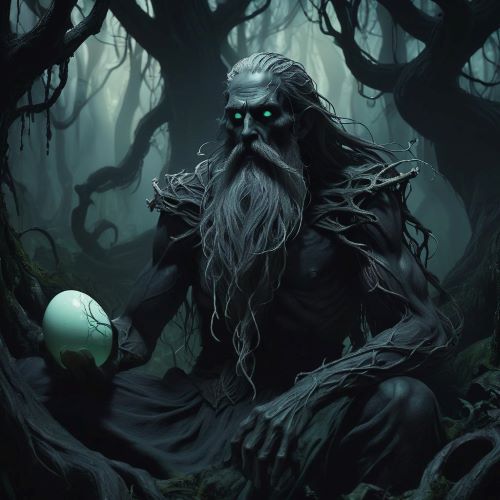Slavic Mortals are essential figures in the vibrant tapestry of Slavic mythology, representing the human experience amid a world filled with gods, spirits, and supernatural forces. Unlike the powerful deities or magical beings that often dominate myth, these mortal characters are grounded in human traits—bravery, cunning, love, and sometimes folly. They are peasants, warriors, kings, and wanderers who interact with the divine, challenge fate, and shape their own destinies. Their stories reflect the values, fears, and aspirations of the ancient Slavic people, making them central to the mythological and cultural heritage of Eastern Europe.
Often portrayed as protagonists in folktales and legends, Slavic Mortals stand out for their resourcefulness and tenacity. These characters may begin as humble villagers or outcasts but rise to greatness through acts of heroism or cleverness. Ivan the Fool is one such example—a recurring folk hero who triumphs not through strength or status but through pure-heartedness and unexpected insight. Other mortals might cross paths with powerful beings like Baba Yaga or the god Perun, navigating these encounters with wit, courage, or careful negotiation. Their ability to survive and even thrive in such encounters speaks to the human capacity to overcome adversity and uncertainty.
The world of Slavic Mortals is one of constant interaction with the otherworldly. In many tales, mortals are tested by spirits of nature, haunted by the restless dead, or gifted magical objects that aid them on their journeys. These stories blur the line between the earthly and the mystical, reflecting a worldview where the sacred and the mundane are deeply intertwined. Mortals often play the role of balance-keepers in these narratives, ensuring that justice is served, curses are broken, or ancient knowledge is preserved. Through their struggles, they illuminate the moral lessons and cultural ideals cherished in Slavic tradition.
Slavic Mortals also embody themes of transformation and destiny. Whether it’s a shepherd destined to become a hero or a young woman fated to break a spell, these figures undergo trials that reshape them and their world. Their journeys often mirror rites of passage, symbolizing personal growth, sacrifice, and redemption. While they may lack the raw power of gods or demons, Slavic Mortals possess a deep connection to the land, family, and spiritual traditions that empower them in subtle yet profound ways. Their triumphs are hard-won, and their failures are cautionary, making their stories both entertaining and instructive.
Today, the legends of Slavic Mortals continue to influence storytelling across literature, film, and folklore studies. Their tales resonate with modern audiences for their humanity, humor, and timeless wisdom. As the guardians of cultural memory and folk wisdom, these mortals remain as relevant now as they were centuries ago. Whether as heroes, fools, or seekers of truth, Slavic Mortals reflect the enduring power of human spirit in a world rich with myth and meaning. Their legacy lives on as a vital part of the Slavic mythological landscape.
Slavic Mortals are essential figures in the vibrant tapestry of Slavic mythology, representing the human experience amid a world filled with gods, spirits, and supernatural forces. Unlike the powerful deities or magical beings that often dominate myth, these mortal characters are grounded in human traits—bravery, cunning, love, and sometimes folly. They are peasants, warriors, kings, and wanderers who interact with the divine, challenge fate, and shape their own destinies. Their stories reflect the values, fears, and aspirations of the ancient Slavic people, making them central to the mythological and cultural heritage of Eastern Europe.
Often portrayed as protagonists in folktales and legends, Slavic Mortals stand out for their resourcefulness and tenacity. These characters may begin as humble villagers or outcasts but rise to greatness through acts of heroism or cleverness. Ivan the Fool is one such example—a recurring folk hero who triumphs not through strength or status but through pure-heartedness and unexpected insight. Other mortals might cross paths with powerful beings like Baba Yaga or the god Perun, navigating these encounters with wit, courage, or careful negotiation. Their ability to survive and even thrive in such encounters speaks to the human capacity to overcome adversity and uncertainty.
The world of Slavic Mortals is one of constant interaction with the otherworldly. In many tales, mortals are tested by spirits of nature, haunted by the restless dead, or gifted magical objects that aid them on their journeys. These stories blur the line between the earthly and the mystical, reflecting a worldview where the sacred and the mundane are deeply intertwined. Mortals often play the role of balance-keepers in these narratives, ensuring that justice is served, curses are broken, or ancient knowledge is preserved. Through their struggles, they illuminate the moral lessons and cultural ideals cherished in Slavic tradition.
Slavic Mortals also embody themes of transformation and destiny. Whether it’s a shepherd destined to become a hero or a young woman fated to break a spell, these figures undergo trials that reshape them and their world. Their journeys often mirror rites of passage, symbolizing personal growth, sacrifice, and redemption. While they may lack the raw power of gods or demons, Slavic Mortals possess a deep connection to the land, family, and spiritual traditions that empower them in subtle yet profound ways. Their triumphs are hard-won, and their failures are cautionary, making their stories both entertaining and instructive.
Today, the legends of Slavic Mortals continue to influence storytelling across literature, film, and folklore studies. Their tales resonate with modern audiences for their humanity, humor, and timeless wisdom. As the guardians of cultural memory and folk wisdom, these mortals remain as relevant now as they were centuries ago. Whether as heroes, fools, or seekers of truth, Slavic Mortals reflect the enduring power of human spirit in a world rich with myth and meaning. Their legacy lives on as a vital part of the Slavic mythological landscape.

